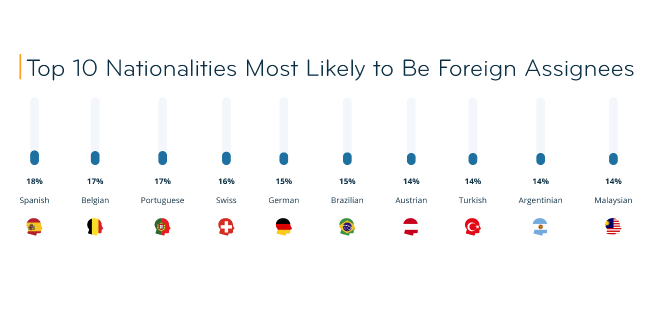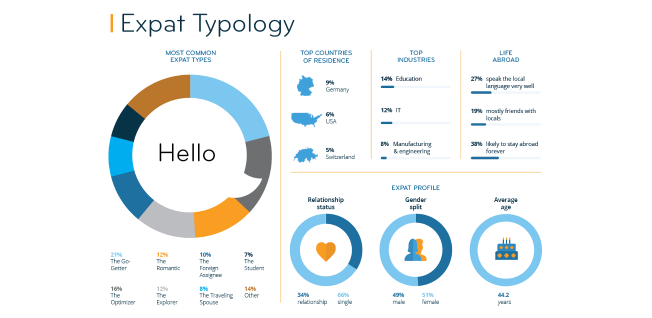The Foreign Assignee: Moving for Their Employer
All Foreign Assignees are sent abroad by their employer, and their stay abroad is clearly focused on their job: nearly every Foreign Assignee (96%) works full time, compared to only 84 percent worldwide. Moreover, with an average of 46.1 working hours per week (vs. 44.0 h globally), they also spend by far the most time at work — even the Go-Getters, who have the second-longest week, work 1.4 hours less.
However, the hard work seems to pay off: more than two in five Foreign Assignees (42%) work in management positions, the highest share among all seven expat types. Moreover, another two in five managers (41%) even have a job in top management. With the Foreign Assignees’ high level of seniority, it might not be a surprise that 26 percent have an annual gross household income of more than 150,000 USD, more than twice the global average (12%). Their generous household income might also be related to the fields they frequently work in: manufacturing & engineering (14%), finance (13%), and IT (11%).
Out of all expat types, Foreign Assignees are the most satisfied with many work-related factors: more than three in five (61%) are satisfied with their career prospects, compared to 55 percent globally. “My job is a challenge, but I have many opportunities to grow as a professional,” states an expat from Peru living in Honduras, while a Swiss expat in Nigeria generally appreciates his “challenging and interesting job”.
In addition to that, almost seven in ten (69%) are happy with their job security, ten percentage points more than the global average (59%). Maybe it’s the opportunity to grow in a secure working environment that leads to 73 percent of Foreign Assignees being generally satisfied with their job. This is eight percentage points more than the global average (65%) and the highest share among all expat types.
Despite their great career options, 58 percent of Foreign Assignees think it likely that they’ll return home at some point (vs. 43% globally), again the highest share out of all seven expat types. In fact, 23 percent of Foreign Assignees don’t feel at home abroad yet, and another 17 percent don’t think they ever will. “It is part of my job,” a Portuguese expat living in Mozambique explains. “I adapt in order to fulfill my work requirements.”
Maybe their struggles with settling in are partly due to the fact that 29 percent of Foreign Assignees find it hard to make friends abroad (vs. 25% worldwide). Moreover, Foreign Assignees seem to stick together: more than two in five (43%) state that their friends are mainly other expats, nine percentage points more than the global average (34%), and only 13 percent are mainly friends with local residents (vs. 19%). With close to half the Foreign Assignees (49%) admitting that they speak the local language just a little bit or even not at all, it might be the language barrier that plays a major role here.













